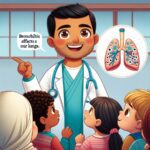Congenital conditions are medical conditions present at or before birth, ranging from mild to severe. New parents may find the term ‘congenital conditions’ daunting, but understanding these conditions can equip you to provide the best care for your child. This article aims to demystify congenital conditions, offering insights into their types, causes, diagnosis, and management.
What Are Congenital Conditions?
Congenital conditions, also known as birth defects, are structural, functional, or metabolic anomalies present at birth. These conditions can result from genetic factors, environmental exposures, or unknown causes. The impact of congenital conditions can vary widely, affecting any part of the body and ranging in severity from mild to life-threatening.
Examples include congenital heart disease, Down syndrome, and cleft lip and palate. While some conditions are detected through prenatal screening, others are diagnosed after birth. Early identification and intervention can significantly improve outcomes for many of these conditions.
How Are Congenital Conditions Diagnosed?
Diagnosis of congenital conditions begins with prenatal screening and diagnostic tests. Ultrasound, amniocentesis, and blood tests can identify many conditions before birth, allowing for early planning and intervention. After birth, newborn screening tests, physical examinations, and further diagnostic testing can identify additional conditions.
Early diagnosis is crucial for managing congenital conditions effectively. It enables healthcare providers to develop a tailored care plan, possibly including surgery, medication, or therapy, to support the child’s development and quality of life.
Managing Congenital Conditions: What New Parents Need to Know
Managing a congenital condition involves a multidisciplinary approach, including pediatricians, specialists, and support services. Treatment plans are individualized, focusing on the specific needs of the child and family. For many conditions, early intervention programs, physical therapy, and special education services can help children achieve their full potential.
Support groups and resources are invaluable for families navigating the complexities of congenital conditions. Connecting with other families facing similar challenges can provide emotional support and practical advice. Additionally, staying informed about the latest research and treatments can empower parents to advocate for their child’s needs.
Congenital Conditions: Common Questions Answered
Parents often have many questions about congenital conditions. Here are answers to some common queries:
- Can congenital conditions be prevented? While not all congenital conditions can be prevented, healthy pregnancy practices, such as taking folic acid and avoiding harmful substances, can reduce the risk of some conditions.
- What is the prognosis for children with congenital conditions? The prognosis varies widely depending on the specific condition, its severity, and the treatment options available. Many children with congenital conditions lead full, healthy lives.
- How can I support my child with a congenital condition? Educating yourself about the condition, seeking appropriate medical care, and finding a supportive community can significantly benefit your child.
Understanding congenital conditions is the first step toward ensuring that children affected by these conditions receive the care and support they need. With advances in medical science, many children with congenital conditions go on to lead happy, fulfilling lives. As a parent, staying informed, seeking support, and advocating for your child can make a significant difference.
For more resources on specific congenital conditions and tips on parenting a child with special needs, visit our internal links: Acid Reflux in Babies, Understanding Autism Spectrum Disorders, and Congenital Heart Disease: What Parents Need to Know.
Furthermore, the Centers for Disease Control and Prevention (CDC) offers comprehensive information on congenital conditions, including research, prevention strategies, and support resources.













